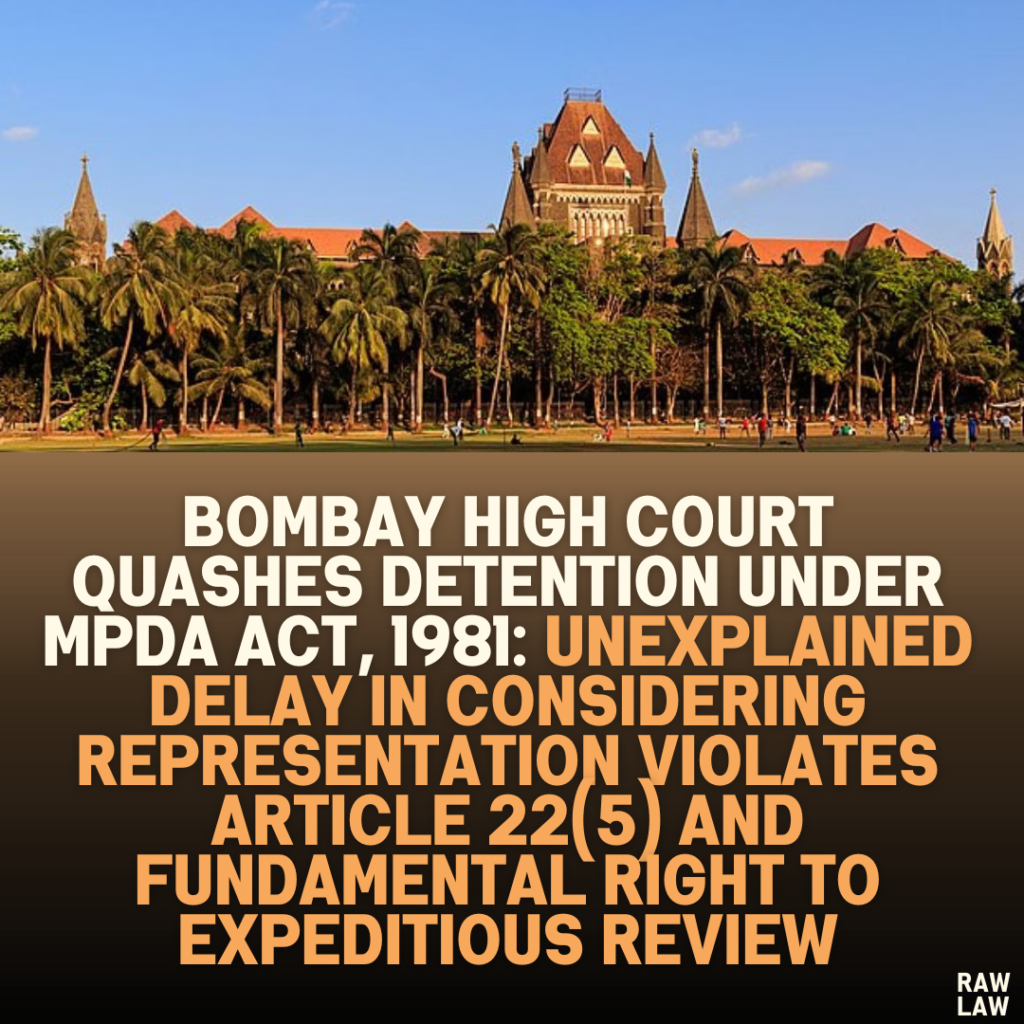Court’s Decision
The Bombay High Court quashed a detention order issued under Section 3 of the Maharashtra Prevention of Dangerous Activities (MPDA) Act, 1981, against the petitioner. The Court ruled that an unexplained delay in processing the petitioner’s representation violated his fundamental rights under Article 22(5) of the Constitution. The detention was declared invalid, and the petitioner was ordered to be released forthwith unless required in another case.
Facts
- Background of Detention:
- The petitioner was detained under an order issued by the District Magistrate, Pune, dated October 1, 2024, under Section 3 of the MPDA Act, 1981.
- The petitioner was placed in Yerwada Central Jail on the same date.
- Grounds for Detention:
- The detention order referred to:
- FIR No. 387 of 2024, registered at Shikrapur Police Station for offenses under Sections 341, 323, 504, and 506 of the Indian Penal Code. This FIR was based on an incident on April 5, 2024, where the petitioner allegedly threatened the informant, damaged his car, and obstructed his path.
- Two in-camera statements of witnesses alleging extortion by the petitioner on June 19, 2024, and June 26, 2024.
- The detention order referred to:
- Representation Submitted:
- The petitioner, challenging the detention, submitted a representation to the State Government dated November 13, 2024.
- This representation reached the Yerwada Central Prison authorities on November 16, 2024, and was forwarded to the State Home Department. However, it only reached the concerned desk at Mantralaya on December 3, 2024.
- Allegation of Delay:
- The petitioner claimed that the delay in processing his representation violated the constitutional mandate under Article 22(5) to consider representations expeditiously.
Issues
- Whether the unexplained delay in processing the petitioner’s representation violated his fundamental rights under Article 22(5) of the Constitution.
- Whether such a delay rendered the detention order invalid.
Petitioner’s Arguments
- The petitioner contended that the delay in processing his representation—17 days between November 16, 2024, and December 3, 2024—was unexplained and unjustifiable.
- The affidavits submitted by the authorities failed to provide any reasons for the delay in transmitting the representation from Yerwada Central Prison to Mantralaya.
- The delay violated his right to have his representation considered expeditiously, as mandated by Article 22(5) of the Constitution.
Respondent’s Arguments
- The State argued that the petitioner’s representation was processed within a reasonable timeframe.
- It claimed that procedural compliance under the MPDA Act had been maintained, and the detention order was valid.
Analysis of the Law
- Constitutional Safeguards:
- Article 22(5) of the Constitution ensures the right of detenues to make a representation against a detention order. Authorities are constitutionally obligated to consider such representations expeditiously.
- Any unexplained delay undermines the validity of the detention order and the detenue’s rights.
- Procedural Safeguards Under MPDA Act:
- The MPDA Act requires strict adherence to procedural timelines to ensure the detention is not arbitrary or oppressive.
- Delays in transmitting or considering representations can vitiate detention orders, even if the grounds for detention are otherwise valid.
Precedent Analysis
The Court reaffirmed established legal principles that unexplained delays in considering detenues’ representations render detention orders invalid. It emphasized that procedural lapses cannot be condoned in preventive detention cases, where personal liberty is at stake.
Court’s Reasoning
- Unexplained Delay:
- The Court noted a significant gap of 17 days between the representation being forwarded from Yerwada Central Prison (November 16, 2024) and its receipt at Mantralaya (December 3, 2024).
- The affidavits filed by the Superintendent of Yerwada Central Prison and the Deputy Secretary, Home Department, failed to explain the reasons for this delay.
- Effect of Delay:
- The Court observed: “It is not that every delay in considering the representation affects the detention, but unexplained delays do so adversely.”
- The authorities’ failure to justify the delay violated the petitioner’s right to have his representation considered expeditiously.
- Violation of Fundamental Rights:
- The delay adversely affected the petitioner’s constitutional right under Article 22(5), rendering the detention order unsustainable.
Conclusion
The Court quashed the detention order dated October 1, 2024, and directed the petitioner’s release unless required in any other case. The judgment emphasized the necessity of strict procedural compliance in preventive detention cases.
Implications
- Accountability in Preventive Detention Cases:
- This judgment reinforces the importance of adhering to constitutional safeguards in preventive detention cases.
- It holds authorities accountable for procedural delays, ensuring that personal liberty is not compromised arbitrarily.
- Significance of Article 22(5):
- The decision highlights the judiciary’s commitment to upholding Article 22(5) of the Constitution, particularly the right to expeditious consideration of representations.
- Procedural Vigilance:
- Authorities dealing with detention cases are reminded to maintain procedural vigilance and provide detailed explanations for any delays.




Pingback: Bombay High Court Upholds Injunction Against Developer for Amending Sanctioned Plans Without Consent, Highlights Misrepresentation and Protection of Flat Purchasers' Rights Under Maharashtra Ownership Flats Act, 1963. - Raw Law